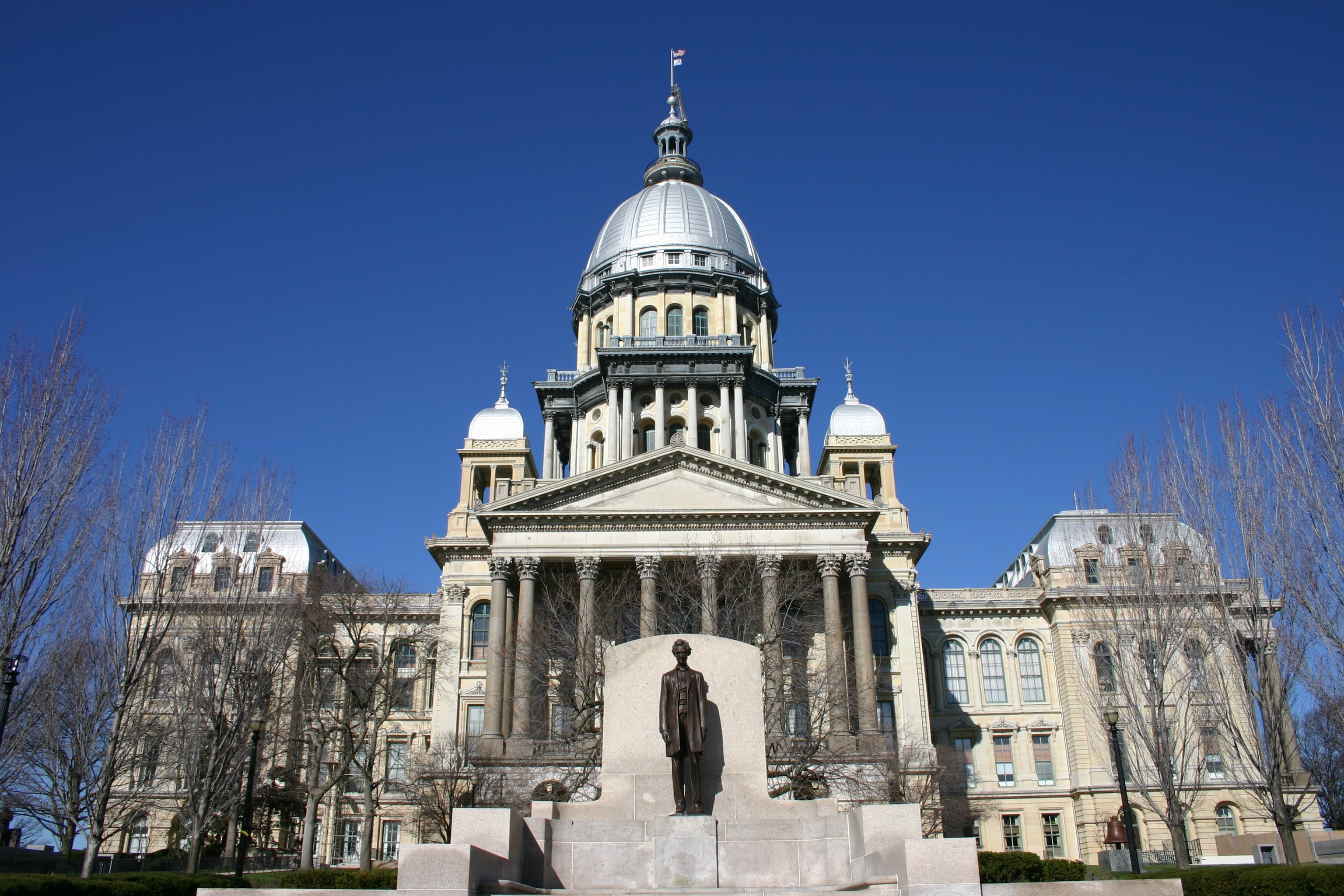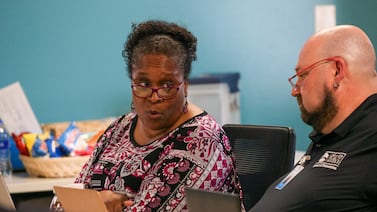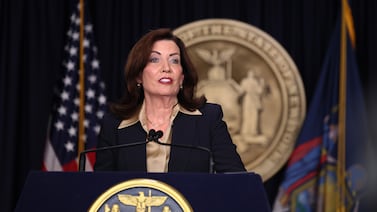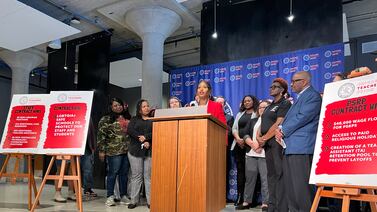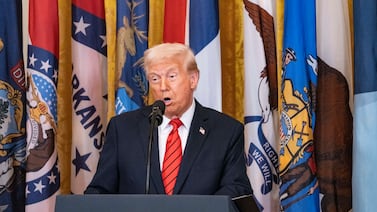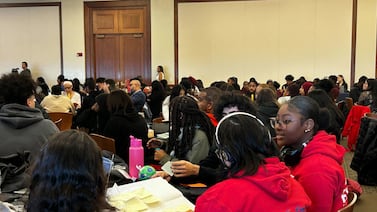Sign up for Chalkbeat Chicago’s free daily newsletter to keep up with the latest news on Chicago Public Schools.
Education funding, protections for immigrant students, and expanded special education are some of the top issues to watch during Illinois’ 2025 legislative session, which began in January.
State lawmakers returned to the Capitol in Springfield last month to start filing hundreds of bills, begin committee hearings, and negotiate over the state’s fiscal year 2026 budget. Legislators have until the end of May to agree to a budget and send bills to Gov. J.B. Pritzker’s desk to be signed into law.
The wild cards during this legislative session are the policy changes that President Donald Trump and the Republican-led Congress are making or discussing. Education advocates are concerned about what those changes will mean for federal education funding for K-12 schools and higher education, oversight of schools, and protections for immigrant and transgender students.
Meanwhile, Republican state lawmakers are pushing bills that align with the Trump administration policies, including restricting participation by transgender students in athletics, and promoting private-school vouchers.
Chalkbeat Chicago will be watching how federal education policy affects Illinois and local school districts. We will be looking out for bills that affect students who are immigrants, students with disabilities, and curriculum.
Here are five issues that we’re watching this spring:
Education budget is a major concern
Illinois school districts could have less money to spend next school year. The $7 billion in COVID emergency relief funding that the state distributed to schools in recent years expired in the fall. And the state’s overall fiscal picture looks pretty bleak: Some state budget officials project the state will have a $3.2 billion budget deficit in fiscal year 2026.
State Superintendent Tony Sanders recommended that the state increase K-12 funding by $350 million, far from the $550 million that education advocates have been calling for over the past few years.
Early childhood education programs could see a boost in funding, since Pritzker has been determined to fund more programs to support the state’s youngest residents under his Smart Start Illinois initiative. For instance, the Illinois State Board of Education’s early childhood block grant program received an increase of $75 million in 2023 and 2024. Sanders requested another increase of $75 million for the grant this year.
Protections for immigrant students
Since Trump’s election, immigrant communities across the city and local advocates have been concerned about his threat of mass deportations of people who are in the country illegally. Just a few days after his inauguration, Trump rescinded the “sensitive locations” policy that kept Immigration and Customs Enforcement officers from making arrests at churches, schools, child care centers, and hospitals.
This change in federal policy has sparked fear in Chicago’s immigrant community. Chicago Public Schools has trained school staff on what to do if ICE officers arrive at a school, and local community organizations have led ongoing “Know Your Rights” training for residents.
Now, state lawmakers are filing bills to protect immigrant students. Bills like HB 3247 and SB 2065 would affirm existing federal guarantees that students receive a free public school education regardless of citizenship or immigration status, and would prevent schools from disclosing information about a child’s immigration status or working with ICE agents.
Senate Bill 2033, the Immigration Safe Zones Act, would create a sensitive location policy in Illinois that keeps ICE agents from accessing schools, daycare centers, medical centers, public libraries, courts, and facilities operated by the Secretary of State — such as local motor-vehicle offices.
State Rep. Fred Crespo, a Democrat representing suburbs northwest of Chicago, has a pair of bills this session, HB 3102 and HB 3104, that would require the State Board of Education to create a New Arrivals Grant program for schools that have seen a high enrollment of students who have immigrated to the United States over the past couple of years. Crespo and education advocates pushed hard for the grant program last session, but it did not make it into the budget.
Supporting students with disabilities
A bill would add Illinois to a push across the country for legislation, known as LEAD-K, that would ensure that students who have hearing disabilities are able to learn and understand language by the time they enter kindergarten. State Rep. Michelle Mussman, a Democrat representing the area around Schaumburg and chair of the House Education Policy Committee, has filed House Bill 1783 — or the Language Equality Acquisition for the Deaf, Hard of Hearing, and Deaf-Blind Children Act — with the goal of helping young children who are deaf learn and understand language by age 6.
The current version of HB 1783 would require the State Board of Education along with other state departments to create an assessment to track literacy and language development skills. The state board would have to create an advisory committee on language assessment programs and publish an action plan by July 1, 2026, and have the assessment ready for children below age 6 to take beginning at that time.
Another notable special education bill is House Bill 2337, which would prevent parents of students from waiving their child’s right under federal law to a free and appropriate public education as a result of a mediation agreement, resolution agreement, or settlement agreement. If this bill is signed, future waivers would not be enforceable in an administrative proceeding or in state or federal courts.
Diversifying history curriculum
Democratic state lawmakers are pushing bills to make history education more inclusive, counteracting a concerted effort by conservative organizations and lawmakers to ban certain types of books from schools and restrict curriculum that teaches students about the enduring legacy of racism in America.
Trump recently signed an executive order to withhold funding from schools that teach what he called “discriminatory equity ideology,” an allusion to diversity, equity and inclusion programs collectively known as DEI.
House Bill 2927 would create an Inclusive History Commission to help develop recommendations for curriculum standards.
A couple of pending bills have similar language to the 2021 Teaching Equitable Asian American Community History Act. House Bill 2997 would require elementary and high schools to include a unit of Arab American history, including in Illinois and the Midwest, by 2026-27. Senate Bill 2270 would require schools to teach a unit of Latino history starting in 2026-27.
House Bill 3198 would allow for educators to teach about disability history and culture beginning during the 2027-28 school year.
Republican lawmakers are making some political moves
Republican lawmakers, outnumbered in the General Assembly, are nonetheless expressing their alignment with the Trump administration by proposing bills that affect immigrant and transgender students and advancing conservatives’ school-choice agenda.
Several Republican-sponsored bills in the House and Senate, including HB 1217 and SB 1202, would repeal the TRUST Act, state law that currently prevents local enforcement from working with ICE agents.
One bill in the General Assembly would prevent transgender girls from participating in school athletic teams and sports. HB 1204 says “athletic teams or sports designated as being female are available only to participants who are female, based on their biological sex.” The bill also would require a written statement by a student’s parent or guardian confirming the student’s age, biological sex, and that they haven’t taken performance enhancement drugs. Government agencies or sports associations wouldn’t be allowed to file a complaint, open an investigation, or take any other legal actions against sports teams that follow language in the bill.
Another bill, HB 2611, would create Education Savings Accounts for families to use public funds to attend private schools.
Samantha Smylie is the state education reporter for Chalkbeat Chicago covering school districts across the state, legislation, special education and the state board of education. Contact Samantha at ssmylie@chalkbeat.org.

